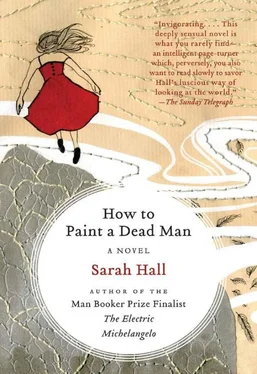Sarah Hall - How to Paint a Dead Man
Здесь есть возможность читать онлайн «Sarah Hall - How to Paint a Dead Man» весь текст электронной книги совершенно бесплатно (целиком полную версию без сокращений). В некоторых случаях можно слушать аудио, скачать через торрент в формате fb2 и присутствует краткое содержание. Год выпуска: 2009, Издательство: Harper Perennial, Жанр: Современная проза, на английском языке. Описание произведения, (предисловие) а так же отзывы посетителей доступны на портале библиотеки ЛибКат.
- Название:How to Paint a Dead Man
- Автор:
- Издательство:Harper Perennial
- Жанр:
- Год:2009
- ISBN:нет данных
- Рейтинг книги:4 / 5. Голосов: 1
-
Избранное:Добавить в избранное
- Отзывы:
-
Ваша оценка:
- 80
- 1
- 2
- 3
- 4
- 5
How to Paint a Dead Man: краткое содержание, описание и аннотация
Предлагаем к чтению аннотацию, описание, краткое содержание или предисловие (зависит от того, что написал сам автор книги «How to Paint a Dead Man»). Если вы не нашли необходимую информацию о книге — напишите в комментариях, мы постараемся отыскать её.
, Sarah Hall, "one of the most significant and exciting of Britain's young novelists" (
), delivers "a maddeningly enticing read... an amazing feat of literary engineering" (
).
How to Paint a Dead Man — читать онлайн бесплатно полную книгу (весь текст) целиком
Ниже представлен текст книги, разбитый по страницам. Система сохранения места последней прочитанной страницы, позволяет с удобством читать онлайн бесплатно книгу «How to Paint a Dead Man», без необходимости каждый раз заново искать на чём Вы остановились. Поставьте закладку, и сможете в любой момент перейти на страницу, на которой закончили чтение.
Интервал:
Закладка:
My dog Benicio died a year ago in the summer. I miss his warm presence in the house. He was a loyal dog with short brown fur and he was run over and could not be saved. In the afternoons the sun is very strong, I think it blinded him on the road or he was sleeping on the warm dirt. His back legs were injured in a difficult way-they had already been broken once before. I wish in mercy that he had died more quickly. A companionable dog cannot be replaced for many years. I do not need one for hunting or digging for truffles but have always enjoyed the easy fellowship of dogs. In any case there are too few years for another, so I have taken to finding company in other ways, such as the radio and writing. At the house now there is me, an old man who does not paint bottles, the little broken lizards, and Theresa, installing her red tomatoes.
To begin each day there is only the wind, asking to come in from the north before even the daylight. It is a rolling wind, excitable as it prepares to leave the continent. Some mornings I will accompany the wind to the road above the town. It helps me to unstiffen. There is sciatica in my legs and my breathing these days is somewhat impaired. Really I can do no more than amble. The land often seems like an ocean below-the hill moves through leaves, wheat, lavender tides. It never reaches the mountains on the horizon, but still we can hope. Heat arrives after the wind has passed over the bricks. Then fire blooms across the tiles of the town. The flames of the sun turn back the petals of the flowers in the gardens. It is as if the ground has secreted embers overnight. If I knelt down and cupped my hands to my lips and blew perhaps the day would start early.
There was no decision made to never leave this place, though it has been said that I renounced everything, that I suffered a great dismay and withdrew. Or that I was possessed by art, removing my heart to paint its space, its absence. This is said because of my wife and child. I am a brute and the work denotes much calculation and control. Old news. When I hear such things I do not ask for sympathy. Whatever sins I have committed exist beyond me now. I will let Nature alone judge me; she will abominate me if it is her finding.
We should not forget that when we limp away afflicted through the spirit, it is not to the factory gates or to the corporate steps we pilgrimage. Instead we go to the sea for its salt. We find shade under the sycamores on the great avenues. Or we go to the rivers where water tells us modestly of its own sickness. I cannot say that I have found peace now. But I have never loved with greater strength than in this place, with its earth the colour of verdaccio and its generous fruit.
Sometimes I long for the wind in the studio, to harden the tips of the brushes if they have not yet been cleaned, to ruffle these pages, as if in answer to a question I have posed. But the studio faces south and its shutters are quite secure. The work must not move or display movement, otherwise I might try to turn the house and gratefully receive the wind. Then the easel would tumble over and the bottles would sing at their necks. This of course is the alternative, which we must all imagine from time to time.
Benicio used to bite the wind. Poor confused dog! If it came suddenly through the trees and assailed the house, if it tugged his ruff and made balloons of his ears, he would snap and snap his jaws. He did not understand that to lean back against the current is to have a firm friend. Instead he was followed by it and it stroked his coat in the wrong direction and it unsettled him. He would consider no truce. But the invisible enemy always prevailed, surprising him from east and west. He snapped and snapped. Then the eating of air inflated his stomach and made it creak, and he would look very sorry for himself. Sometimes his growling and shouting at the wind, or the wind’s retaliation, disrupted the boar, and Benicio’s adversary was finally made manifest, squealing and grunting as it charged. Then retreat, retreat, back into Serra Partucci! The wind, the dog and the boar; it was such a comedy, like the American brothers.
Today I have also received a letter from England, forwarded by Antonio at the agency. It is a delight. A young man called Peter is asking technical questions about a still-life of 1959. He asks about the placement of the china rectangle, the way one side is favoured slightly in the composition and rests against the left-hand vessel. He does not believe the rectangle is tucked behind its neighbouring box, as the artist seems to imply, but that it exists in the frontal plane, its angles shortened. He mentions the white piping through the vase and its relation to a mathematical scale. He asks, am I the inventor of negative space? He writes in English, with regret, and I am able to translate most of it. For that which I cannot, I have asked Theresa to retrieve a dictionary of phrasing from the library. This has displeased her; she does not approve of ferrying intellectual books in the basket of her bicycle. Is L’Unità not too heavy for you to cycle with, I ask her, and she clicks her tongue. We must not talk of politics or newspapers, Theresa and I.
In the letter the young man says he does not know where the artist of the piece could have been standing during its production, such is the ‘almost independent but myopic’ perspective of it. There is, within his letter, the subjective mania of the youthful mind. Alas, he is too excitable, for there is no address to which I might return his correspondence. The painting was sold to a private collector; perhaps the young man has seen a reproduction, or perhaps the original if it is on loan. I do not always know the whereabouts of the paintings, though Antonio keeps good records. Peter tells me he is a student of art in Liverpool and he is eager to learn. From the slope of the lettering, and the dragging of the palm across the ink, I can see that he is a left-handed scribe, like Leonardo. His wishes are kind in conclusion. His signature is flourished. Peter; I will remember his name.
And I will test myself with the questions posed. The piece was completed six years ago. It contained the tall blue bottles, a hatbox, a china receptacle. In 1959 the red towers of Bologna were still standing impressively, having survived the war. Wine was less expensive. Cardinal Montini kissed the reactor at Ispra and we entered the new atomic age. Benicio was troubled by his hindquarters, and was limping. I was troubled by arthritis, and dropping things. There was a ladder placed against the rear wall of the studio. First I worked on its third step, with the easel set at its highest bolt. Further away to achieve detachment: the vantage point of a ghost. Then I set the easel an arm’s length from the objects and in this way found greater detail.
Of all the conditions we experience, solitude is perhaps the most misunderstood. To choose it is regarded as irresponsible or a failure. To most it should be avoided, like an illness. Inside solitude people see the many compartments of unhappiness, like the comb of a pomegranate. To be emptied from the world, to be cast away and forgotten — is this what we fear most? So we must shake hands and pass money and hear talk of society and talk of our families and our selves. We must move in and out of doors, press buttons for lifts, catch each other’s colds, laugh and weep, and contribute to the din and the restlessness. We must dance and sing, and visit the courts. We must make these daily contracts.
But if it is embraced solitude is the most joyful of commitments. In the grace of these quiet rooms I know far better the taste of each day. How well I know life. I understand water in its glass. As the afternoon circles, shadows move behind the objects on the table. There is a pinch of cinnamon in Theresa’s lamb casserole. Such acceptance! Such intimacy! The paint on the chassis of the easel is as thick as guano on the cliffs where seagulls nest.
Читать дальшеИнтервал:
Закладка:
Похожие книги на «How to Paint a Dead Man»
Представляем Вашему вниманию похожие книги на «How to Paint a Dead Man» списком для выбора. Мы отобрали схожую по названию и смыслу литературу в надежде предоставить читателям больше вариантов отыскать новые, интересные, ещё непрочитанные произведения.
Обсуждение, отзывы о книге «How to Paint a Dead Man» и просто собственные мнения читателей. Оставьте ваши комментарии, напишите, что Вы думаете о произведении, его смысле или главных героях. Укажите что конкретно понравилось, а что нет, и почему Вы так считаете.












